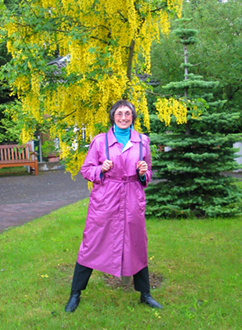 Name: Hope Knutsson.
Name: Hope Knutsson.
Where I live: Reykjavik, Iceland.
Where I was born: Born and raised in Brooklyn, N.Y., of Russian, Hungarian, Polish and German descent. I have dual citizenship: Icelandic and American.
Family: Husband, Einar Knutsson; son, Tryggvi Einarsson; daughter, Katla Einarsdottir.
Education: B.A. in psychology and philosophy, master’s in occupational therapy.
Original occupation: Psychiatric occupational therapist.
Career: Founder and president of Sidmennt, the Icelandic Ethical Humanist Association.
How I got where I am today: I’ve been a social activist all of my adult life, first in the U.S. and then in Iceland, where I’ve started and led various organizations and movements (a mental health association built on a self-help, empowerment model, an English-speaking foreigners association, a multicultural council and a secular humanist association). I established a civil confirmation program for teenagers and have been coordinating it for 25 years.
Civil confirmation is a secular alternative to religious confirmation and exists in all the Nordic countries and some other European nations. It consists of a course mainly about ethics, human rights, human relations, critical thinking and related subjects followed by a festive graduation ceremony.
Where I’m headed: I’ll continue to work for complete religious freedom, separation of church and state and a secular society in Iceland.
What’s it like to live in Iceland? I’ve lived here 39 years. The population is only 320,000, and everyone knows almost everyone else or is related. There are advantages and disadvantages to that.
There are some wonderful things about Iceland: It is a Nordic social democracy. It has no military. Nobody’s tax money is spent on building bombs or training people to kill. About 86% of homes are heated by cheap geothermal energy. There are no nuclear power plants and little pollution. We have many volcanoes, hot springs, geysers and waterfalls.
Icelandic is an archaic, difficult and very limited language with only around 90,000 words, compared with close to a million in English. I can read, speak and understand it well, but even after 39 years I need other people to correct everything that I write.
The climate is temperate. In winter the temperature hovers around the freezing point but rarely goes below that. There’s a lot of strong wind here which can make it feel colder. However, Iceland is surrounded by the Gulf Stream, so it’s warmer than people imagine because of the name. We don’t get much snow in Reykjavik, and when it comes, it usually melts within hours. In summer the temperature is around 60 degrees, sometimes higher. We have midnight sun from June through August, which is fabulous. The darkest months are from the end of November through late January, when we have just under five hours of true daylight with an hour or so of twilight on either side of that. The Northern Lights are breathtaking and magical!
Person in history I admire: Thomas Paine and Carl Sagan. I think that using reason and critical thinking are positive approaches to life and help move humankind forward. Promoting the scientific method and popularizing scientific knowledge are noble and inspiring endeavors.
A quotation I like: It’s good to have an open mind but not so open that your brains fall out.
• Science thrives on unanswered questions. Religion, in contrast, thrives on unquestioned answers.
• Insanity is continuing to do the same thing over and over again and expecting to get different results. (Einstein)
• I cannot believe in a god who wants to be praised all the time. (Nietzsche)
• If you don’t pray in my school, I won’t think in your church.
• You can’t have everything. Where would you put it?
• The belief that some cosmic Jewish zombie can make you live forever if you symbolically eat his flesh and telepathically tell him that you accept him as your master, so he can remove an evil force from your soul that is present in humanity because a rib-woman was convinced by a talking snake to eat from a magical tree; makes perfect sense!
These are a few of my favorite things: Irish traditional music and other folk music, classical music, midnight sun, northern lights, trees, frogs, salamanders, newts and efts.
These are not: People jumping to conclusions with little evidence; extreme nationalism, which I view as a destructive and divisive force.
My doubts about religion started: I grew up in a secular home and am grateful for not having been indoctrinated with religion. My parents sent me to Sunday school for one winter when I was 8, and I remember thinking that all those bible stories sounded like fairy tales. I couldn’t believe that anyone believed them.
Instead of “thank God” or “God bless you,” I say: “Thank goodness” and “gesundheit.”
Why I’m a freethinker: Majoring in philosophy and psychology in undergraduate school helped me to build on the tendency that I already had.
Ways I promote freethought: The organization which I helped to establish in 1990 and of which I have been president for many years, works to get religious indoctrination out of public schools, to change laws and regulations at the local and national level so that all life stance [worldview] perspectives, as well as nonreligious spiritual or philosophical alternative organizations are treated equally, and to educate the public about freethought, skepticism, philosophy, science, religious freedom and secularism.
Conducting secular and humanist ceremonies also contribute to these goals.

